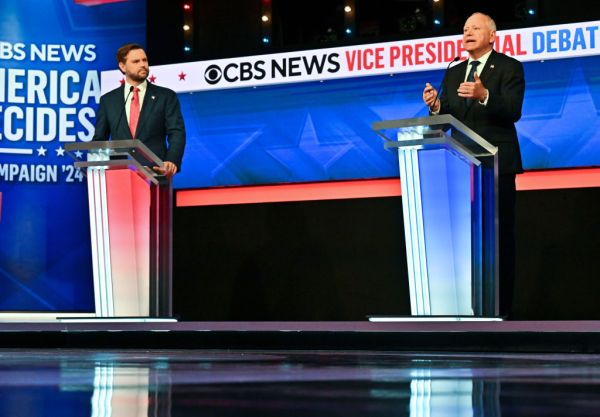In an era of ugly legislative gridlock, it’s easy to forget that progress isn’t necessarily pretty.
Last week, Washington got blindsided by the unveiling of the Inflation Reduction Act of 2022. For Democrats it was a moment of spontaneous joy, while Republicans reacted with instantaneous outrage.
In brief, here’s what happened. The Senate passed, on a bipartisan basis, the CHIPS and Science Act, which would spend up to $280 billion to subsidize domestic microchip production. The bill is flawed, but justifiable on national security grounds. Then almost immediately afterward, Senate Majority Leader Chuck Schumer and Sen. Joe Manchin (D-West Virginia) announced their Inflation Reduction Act, which is mostly a vastly scaled down version of the old Build Back Better package that Manchin blocked almost single-handedly for more than a year.
Republicans were furious because they were led to believe such a thing was impossible. In what appeared like a fit of pique, they blocked the PACT Act, a bill aimed at helping veterans harmed by burn pits in war zones. Except in June the same bill had passed the Senate 84-14 (it had to be reintroduced for technical reasons). In other words, the “support the troops” party voted down a pro-veteran bill they had supported just to spite the Democrats.
Republicans deny such motivations, and some, like Sen. Patrick J. Toomey of Pennsylvania, have plausible explanations. But the GOP certainly leapt at the opportunity to look like sore losers. Sen. Susan Collins (R-Maine) says GOP feelings are so hurt over the Manchin Maneuver, her colleagues might balk on a bill to recognize gay marriage too.
Now, I get spite. But what’s more confounding is how so many progressives are hailing the Inflation Reduction Act as a huge victory for Joe Biden and the left. For most of Biden’s time in the White House, progressives insisted that even the $3.5 trillion they demanded for Build Back Better was itself the bare minimum and even a painful compromise. “I already negotiated. The truth is we need more,” Sen. Bernie Sanders of Vermont, who had wanted anywhere from $6 trillion to $16 trillion in climate spending, told Politico. The $3.5 trillion, he said, is “the minimum of what we should be spending.” Sen. Edward J. Markey (D-Mass.) said a year ago that the $3.5 trillion was merely a “down payment.”
Now, everyone is cheering a bill that spends a comparatively meager $369 billion on climate-related subsidies. The rest of the measure’s $739 billion price tag goes to extending Obamacare provisions, prescription drug subsidies, expanding the Internal Revenue Service workforce and various tax hikes aimed at deficit reduction.
I have many substantive objections to the bill which, if passed, is unlikely to have nearly the success its backers claim at reducing emissions or increasing revenues. For instance, the extension of the eligibility for the carried interest deduction from three years to five is supposed to be a major broadside against perfidious private equity fat cats, but the average amount of time investors hold assets is about five years anyway.
More annoying is Manchin’s claim that this is just about “closing loopholes” when the bill is chock-a-block with loopholes for green energy firms, just as the CHIPS bill was for manufacturers. Subsidizing affluent people to buy electric cars and shoveling subsidies to Democrat client industries is good politics for Biden, but I’m old enough to remember Solyndra.
But my consternation is mostly political. If you had told Republicans that they could derail the old BBB with a deficit reduction package that spent just 10 cents for every dollar the Democrats wanted, a lot of them would have counted themselves lucky. And if Biden had pushed for such a deal, the same people popping champagne now would be denouncing Biden as a sellout.
It’s all the stranger because Biden didn’t push for this bill. Everyone’s touting this deal as a huge win for Biden when he had nothing to do with it. Indeed, Manchin says that he kept Biden out of negotiations because Biden’s involvement would have messed it all up. Biden campaigned on the promise that he knew how to work with Congress, but he was entirely out of the loop.
After a spate of brutal polls for Biden and his party, the Democrats who wanted the moon, are happy to celebrate moon rocks. And Republicans have gotten so entitled to winning that in their outrage over losing, they’d rather vote against legislation they support. It’s almost as if policy were an afterthought.









Please note that we at The Dispatch hold ourselves, our work, and our commenters to a higher standard than other places on the internet. We welcome comments that foster genuine debate or discussion—including comments critical of us or our work—but responses that include ad hominem attacks on fellow Dispatch members or are intended to stoke fear and anger may be moderated.
You are currently using a limited time guest pass and do not have access to commenting. Consider subscribing to join the conversation.
With your membership, you only have the ability to comment on The Morning Dispatch articles. Consider upgrading to join the conversation everywhere.